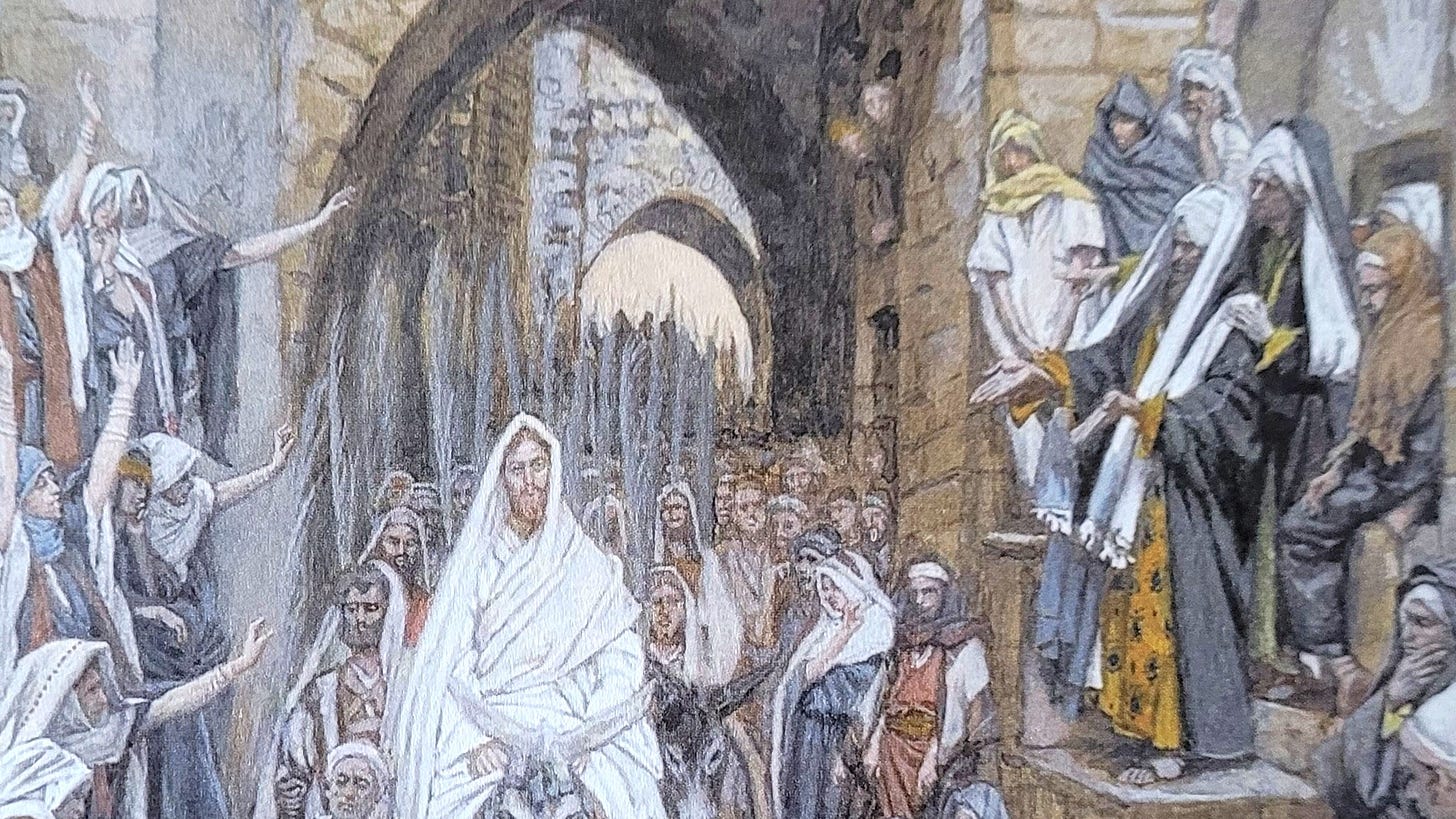What was it about Palm Sunday that most surprised the Pharisees?
The triumphal entry marked change in Our Lord's acceptance of honours from his followers.

The triumphal entry marked change in Our Lord's acceptance of honours from his followers.
Editor’s Notes
In this Part, Fr. Coleridge tells us…
How the crowd unwittingly becomes the Church’s voice in praising the Redeemer.
That Christ openly accepts divine honours and messianic titles for the first time.
Why the shouts of the multitude carry more truth than they understand.
He shows us that God ordains even imperfect instruments to proclaim the truth of His Kingdom.
There is so much material that we could share during Holy Week. Rather than trying to provide it all, we will instead focus on how and why Christ’s triumphal entry into Jerusalem provides a key to the whole of his blessed and glorious Passion.
The Procession of Palms
Passiontide, Part I, Chapter II
St. Matt. xxi. 14-17; St. Mark xi. 1-11; St. Luke xix. 29-44; St. John xii. 12-18.
Story of the Gospels, § 132
Burns and Oates, London, 1889
Headings and some line breaks added.
Sung on Palm Sunday
Our Lord casts reserve aside and enters Jerusalem as Christ the King
What was it about Palm Sunday that most surprised the Pharisees?
Acclamations of the crowd
‘And they brought the ass and the colt, and they brought the colt to Jesus, and casting their garments on the colt, they sat Jesus thereon. And as He went they spread their clothes underneath in the way, and a very great multitude spread their garments in the way, and others cut down boughs from the trees, and strewed them in the way.
‘And when He was now coming near the descent of Mount Olivet, the whole multitude of His disciples began with joy to praise God with a loud voice for all the mighty works which they had seen, saying, Blessed be the King Who cometh in the name of the Lord, peace in Heaven, and glory on high.
‘And they that went before, and them that followed, cried, saying, Hosanna to the Son of David, Blessed is He that cometh in the name of the Lord, Blessed be the kingdom of our father David that cometh, Hosanna in the highest.’1
It is very likely that the persons who composed the crowd, and even the Apostles themselves who became its involuntary leaders, found themselves borne on by an irresistible impulse, both in what they did and in what they said on this great occasion, so as to become the mouthpieces, so to say, of the Church in all ages, in giving due honour and praise to our Lord.
As they little understood the greatness of the occasion itself, what it was that our Lord was about to do, what kind of a kingdom it was that He was now about to found, and what the marvellous Divine acts on which it was to be founded, so also it may be well supposed that they did not understand the words that were put into their mouths as the expressions of the honour and thanksgiving which were due to Him for what He was doing and had done. The words themselves, as we shall see, are, more or less, taken from the Scriptures of the Old Testament.
Words from Psalm xvii
The word Hosanna is taken from Psalm cxvii., which was sung on solemn occasions by the Jews, and which has a most direct and plain reference almost all through the sacrifice of our Lord. It is translated ‘Save us,’ or ‘Save now,’ but seems to mean ‘Salvation to the Son of David’ in this place.
The words, Blessed be He that cometh in the name of the Lord,’ follow in the same verse in the Psalm. The full meaning which belongs to the words of the crowd was probably not understood by them at the time. They were the highest terms of praise and welcome that they could use, and were accepted by our Lord in their divine meaning in which the Church understands them when she uses them in the liturgy of the Adorable Sacrifice.
Echo of the Angelic Song (Gloria in excelsis)
They were re-echoed by the multitude, some using one set of expressions, and others using others. As has been said, the word Hosanna seems to include praise, and it may be here in the mouths of the disciples considered as an echo of the song of the angels at Bethlehem, ‘Glory to God in the highest!’ especially as St. Luke, who relates that angelic song, puts in the word peace as well as glory.
The next idea set forth in this song of praise is that which relates to our Lord’s own Person. He it is Who is the ‘Blessed One Who cometh in the name of the Lord, the King Who cometh in the name of the Lord, the Son of David,’ and this is further carried on to the blessing of the kingdom itself. ‘Blessed be the kingdom of our father David that cometh.’ And the repetition of the former words, with reference to this kingdom, expresses the further truth, that the kingdom embodies and establishes for ever the boons which are thus mentioned. It is the kingdom of peace in Heaven and glory on high, Hosanna in the highest.
And the declaration that He that cometh comes in the name of the Lord, implies that He comes not simply in the name of God, but as having been promised and foretold as so coming, bearing with Him the faithful mercies of David, or promises of mercy made to David. Here again the crowds echo unconsciously the words of the Angel to our Blessed Lady at the Annunciation, that our Lord should have given to Him the throne of His father David, and that He should reign in the house of Jacob for ever, and that of His Kingdom there should be no end.2
The cavils of his enemies
The large class of devout and pious Jews, of whom we may suppose the greater part of the crowd to have been composed, were probably familiar with the language of the Psalms and Prophets, from which these phrases are gathered. But it needed some special guidance of the Holy Ghost to bring them together, just as they are, neither more nor less.
We cannot be surprised to find some of the Pharisees, the inveterate enemies of our Lord, among the multitude, and to find them, moreover, at their old occupation of criticizing and fault-finding.
The expressions of the disciples were certainly significative of the highest conceptions with regard to our Lord’s dignity and Person, and they went far beyond anything that He had up to this time accepted either privately or publicly. When the young ruler had called Him good, He had rebuked him, as if the name belonged only to God. When His enemies had blamed His calling Himself the Son of God, He had quoted the Psalm in which that Name had been used of the servants of God in the Old Testament.
But now the time was come when He would permit the use of such words simply, and no longer condescend to explain them away.
‘The stones will cry out’
The words of the disciples implied His Royal dignity, and, if rightly understood, His Divinity also. If they were not so understood by all who used them, they very clearly and unequivocally signified the kingly rights of His Sacred Humanity, and might, at all events, be used to support the charge that He was making Himself a King.
This was the most dangerous claim, in one sense, which could be made for Him, because it might be understood as bringing Him directly in collision with the rights of Cæsar. The Pharisees may have expected, therefore, that He would pointedly disclaim the power thus attributed to Him. Perhaps, at an earlier period of His Ministry, He would not have allowed His disciples so to speak.
But here we come upon another instance of our Lord’s change of demeanour and attitude towards His enemies. Instead of bidding His disciples modify their language, or of excusing them to their critics, He answered by approving their words in the plainest way.
‘He said to them, I say to you, if these shall hold their peace, the stones will cry out!’
End of Part III of our Passiontide and Holy Week focus on the Triumphal Entry.
In the next part, we see more of Christ’s changed demeanour to his enemies and acknowledgment of his the divine honours being rendered to him.
Subscribe to never miss an article:
The Procession of Palms
Our Lord casts reserve aside and enters Jerusalem as Christ the King
What was it about Palm Sunday that most surprised the Pharisees?
Read Next:
Here’s why you should subscribe to The Father Coleridge Reader and share with others:
Fr Coleridge provides solid explanations of the entirety of the Gospel
His work is full of doctrine and piety, and is highly credible
He gives a clear trajectory of the life of Christ, its drama and all its stages—increasing our appreciation and admiration for the God-Man.
If more Catholics knew about works like Coleridge’s, then other works based on sentimentality and dubious private revelations would be much less attractive.
But sourcing and curating the texts, cleaning up scans, and editing them for online reading is a labour of love, and takes a lot of time.
Will you lend us a hand and hit subscribe?
Follow our projects on Twitter, YouTube and Telegram:
St. Matt. xxi. 4-9; St. Mark xi. 7-10; St. Luke xix. 35-38; Story of the Gospels, § 132.
St. Luke i. 32, 33.




